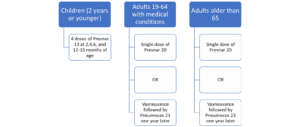
What is Pneumonia?
Pneumonia is a lung infection that can be caused by bacteria, viruses or fungi. The most common bacteria that causes pneumonia is called streptococcus pneumonia. The infection can cause the lungs to become inflamed and fill with pus or fluid making it difficult to breathe. The symptoms of pneumonia can be mild to severe and may include:
- Cough
- Fever
- Shortness of Breath
- Rapid, shallow breathing
- Sharp chest pain that gets worse when you inhale or cough
- Loss of appetite
- Low energy
- Nausea and vomiting
- Confusion, especially in older adults
Who is at risk for Pneumonia?
Anyone can get pneumonia, but certain factors may increase your risk including:
- Age greater than 65
- Certain medical conditions such as COPD, cystic fibrosis, heart disease, and diabetes
- Weakened immune system from chemotherapy, HIV/AIDS or organ transplant
- Difficulty swallowing
- Recent hospitalization, especially intensive care and using a ventilator to breathe
- Smoking
Can you prevent Pneumonia?
Yes! There are several things we can do to help lower the risk of catching pneumonia. Pneumonia is spread through direct person to person contact. Vaccinations can provide the best protection against the most common bacteria that causes pneumonia. Getting vaccinated not only protects you but also protects those around you. Also, smoking increases your risk due to tobacco damaging your lungs. This makes it difficult to fight infections. Quitting smoking is a great way to lower your risk of pneumonia. Finally, frequent and proper hand washing has been proven to prevent the spread of disease.
What vaccines are available?
There are four types of vaccines that help protect against streptococcus pneumonia. Each vaccine covers different types of pneumonia bacteria.
- Prevnar 13 (PCV13)
- Vaxneuvance (PCV15)
- Prevnar 20 (PCV20)
- Pneumovax 23 (PPSV23)
Who should get vaccinated?

Adults who smoke or have chronic medical conditions including heart disease, COPD, asthma, liver disease, cochlear implant, CSF leak, sickle cell disease, kidney disease, HIV infection, or weakened immune system from chemotherapy or organ transplant should receive a pneumonia vaccine.
Contact your pharmacist if you have already received a pneumonia vaccine to assess your eligibility to receive one of these vaccines or to complete your series.
What are the side effects of the vaccine?
The most common side effects of the vaccine are injection site related including pain, redness and swelling at the injection site. Other common side effects may include:
- Chills
- Fatigue
- Headache
- Muscle soreness
- Fever
The risk of serious side effects is very small. Less than 1% of people have reported severe allergic reactions. It is important to discuss the risks and benefits of vaccination with your doctor or pharmacist.
How can I make an appointment?
Call Bremo Pharmacy at 804-288-8361 to schedule an appointment today! Visit our website www.bremorx.com to find out what other vaccinations are available at Bremo Pharmacy.


